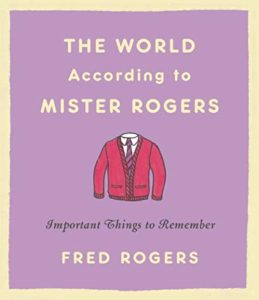Quotes from The World According to Mister Rogers: Important Things to Remember by Fred Rogers
“It’s not the honors and the prizes and the fancy outside of life that ultimately nourish our souls. It’s the knowing that we can be trusted, that we never have to fear the truth, that the bedrock of our very being is firm.”

“Confronting our feelings and giving them appropriate expression always takes strength, not weakness. It takes strength to acknowledge our anger, and sometimes more strength yet to curb the aggressive urges anger may bring and to channel them into nonviolent outlets. It takes strength to face our sadness and to grieve and to let our grief and our anger flow in tears when they need to. It takes strength to talk about our feelings and to reach out for help and comfort and we need it.”
“All our lives, we rework the things from our childhood, like feeling good about ourselves, managing our angry feelings, being able to say good-bye to people we love.”
“The thing I remember best about successful people I’ve met all through the years is their obvious delight in what they’re doing…and it seems to have very little to do with worldly success. They just love what they’re doing, and they love it in front of others.”
“Deep within us – no matter who we are – there lives a feeling of wanting to be lovable, of wanting to be the kind of person that others like to be with. And the greatest thing we can do is to let people know that they are loved and capable of loving.”
“If the day ever came when we were able to accept ourselves and our children exactly as we and they are, then, I believe, we would have come very close to an ultimate understanding of what “good” parenting means. It’s part of being human to fall short of that total acceptance – and often far short. But one of the most important gifts a parent can give a child is the gift of accepting that child’s uniqueness.”
“Forgiving and forgetting are often paired together, but the one certainly doesn’t necessarily follow the other. Some injuries, real or imagined, we may never be able to forget, even though we say we’ve forgiven them. Other injuries we may never even be able to say that we forgive. Those are the ones, it seems to me, most likely to involved people we’ve loved, and so I’m inclined to look at what our experiences of forgiveness may have been like from the first people who loved us.
The first time we required forgiveness, we probably did something we shouldn’t have when our closest grown-ups thought we should have known better. We made someone angry. We were to blame. What did the first brush with blame begin to teach us?
If we were fortunate, we began to learn that “to err is human.” Even good people sometimes do bad things. Errors might mean corrections, apologies, repairs, but they didn’t mean that we, as a person, were a bad person in the sight of those we loved. The second thing we learned (if we were fortunate) was that having someone we loved get mad at us did not mean that person had stopped loving us; we had their unconditional love, and that meant we would have their forgiveness, too.”
“Just as it takes time for children to understand what real love is, it takes time for parents to understand that being always patient, even-tempered, and respectful isn’t necessarily what “good” parents are. In fact, parents help children by expressing wide range of feelings – including appropriate anger. All children need to see that the adults in their lives can feel anger and not hurt themselves or anyone else when they feel that way.
“In the external scheme of things, shining moments are as brief as the twinkling of an eye, yet such twinkling are what eternity is made of – moments when we human beings can say “I love you,” “I’m proud of you,” “I forgive you,” “I’m grateful for you.” That’s what eternity is made of: invisible, imperishable good stuff.”
“To me, what makes someone successful is managing a healthy combination of wishing and doing. Wishing doesn’t make anything happen, but it certainly can be the start of some important happenings. I hope you’ll feel good enough about yourself, your yesterdays and your today, that you’ll continue to wish and dream all you can. And that you’ll do all you can to help the best of your wishes come true.
I’m proud of you for all the wishing and doing that has helped you get to this point in your lives, and I hope you are too.”
“All of us, at some time or other, need help. Whether we’re giving or receiving help, each one of us has something valuable to bring to this world. That’s one of the things that connects us as neighbors – in our own way, each one of us is a giver and a receiver.”
“As human beings, our job in life is to help people realize how rare and valuable each one of us really is, that each of us has something that no one else has – or ever will have – something inside that is unique to all time. It’s our job to encourage each other to discover that uniqueness and to provide ways of developing its expression.”
“More and more I’ve come to understand that listening is one of the most important things we can do for one another. Whether the other be an adult or a child, our engagement in listening to who that person is can often be our greatest gift. Whether that person is speaking or playing or dancing, building or singing or painting, if we care, we can listen.”